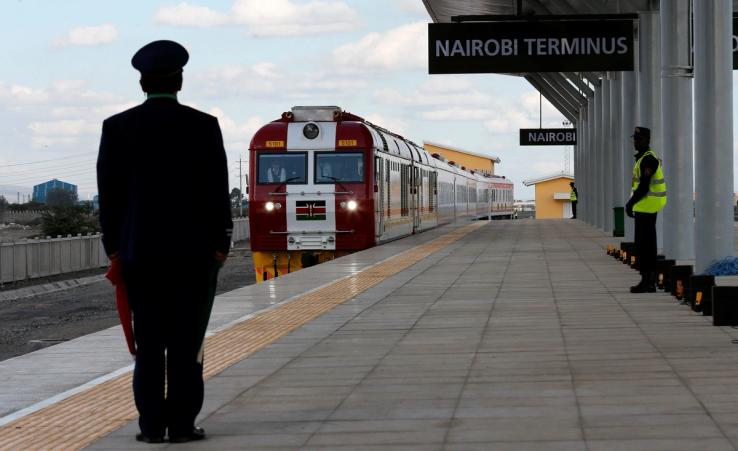Andy’s view
US President Donald Trump’s boycott of this weekend’s G20 meeting in Johannesburg has been widely cast as a win for China, and for good reason: The US appears to be turning its back on Africa just as Beijing surges its infrastructure and investment commitments to the continent after a long lull. A new wave of projects this year features clean technology — solar, wind, batteries — as well as billions for oil and gas.
Yet, China’s track record in Africa is decidedly mixed. Beijing’s mercantilist trade practices are a growing threat, as artificially cheap Chinese products — blocked from the US by Trump’s tariffs — inundate markets across the continent.
At the same time, heavy debts to China are squeezing African nations like Congo Brazzaville, Kenya, and Zambia, the legacy of a financial crash triggered by the COVID pandemic that left these countries struggling to pay for all the roads, railway lines, ports and other infrastructure that China installed. Perversely as a result of that crisis, China’s approach to Africa and other emerging economies is becoming more hard-nosed: Beijing is supplying fewer public goods, like highways, and backing projects with strong cash flows, like fossil fuel facilities.
African nations are thus trapped: They may complain about some of these problems but only China is offering investments at scale. Powers that can match Beijing’s funding capacity — think the US with Wall Street, or the EU — cannot come close to the speed at which it delivers projects or, for that matter, its technical expertise, and vice versa.
The US and other Western powers talk a big game about competing with China’s long-running Belt and Road Initiative but their efforts have come up far short. Instead, the US has largely dismantled its foreign aid program, while the EU, UK, and other Western economies scale back theirs.
As a result, Beijing is moving closer to its goal of forging an alternative to the US-led global order — not because of any great enthusiasm among indebted countries of the Global South, but by default. Writing in Foreign Affairs recently, Jeffrey Prescott and Julian Gewirtz — two Biden-era foreign-policy officials — argue that China is going all out to exploit Trump’s “willing abdication” of Washington’s global role. “If this gambit succeeds,” they write “it will transform the international order from the inside out, placing China at center stage.”
When it comes to the US, Trump’s tariffs are hitting certain countries in Africa especially hard. South Africa’s rate, at 30%, is the highest of any African country, and thousands of jobs in the agricultural and automotive sectors are now at risk in the continent’s largest economy.
“America First” ideology is pushing the US and Africa even further apart: The New York Times reports that US officials working on documents ahead of the G20 meeting — the first in Africa — objected to the word “transition” in relation to clean energy, as well as terms like “equity” and “universal health care.” There’s no bridging this kind of divide; South African president Cyril Ramaphosa reacted to news that Trump was snubbing the G20 gathering, citing discredited allegations that his country is mistreating white farmers, with a shrug. “Their loss,” he said.
Like their counterparts around the world, governments in Africa would mostly prefer to get along with both superpowers. After all, the US consumer market is still the world’s largest. And while China has granted 53 African nations duty-free access to its market, importing isn’t part of the country’s DNA: China is primarily a seller, not a buyer.
But Africa desperately needs investment — and China is coming through with it once more.
Data gathered by Christoph Nedopil, a professor at Griffith University in Australia, show that China’s Belt and Road commitments in the first six months of this year hit a record $124 billion, with $39 billion earmarked for Africa. And a growing share is coming from nominally private companies like Huawei, maker of smartphones, telecom equipment, and AI software, and CATL, the battery giant. The projects they deliver are cleaner and greener than prior efforts, in line with Chinese leader Xi Jinping’s latest “small and beautiful” mantra. Increasingly, solar panels and wind turbines will be made in Africa, rather than shipped in.
The continent’s biggest challenge will be to persuade China to transfer know-how, along with technology. The vocational training centers that Beijing has opened in 15 African countries come with a cute name — Lu Ban, the Chinese patron deity of carpenters — but Africa needs more than a few workshops. True partnership would require sprawling educational campuses, like those in China, minting engineers and technicians by the thousands every year, along with stronger Chinese commitments to local employment, content, and R&D so that Africa can climb the value chain.
Of course, the US is offering nothing of the kind, anyway. Africa and other emerging economies seeking to industrialize are out of options.
Room for Disagreement
A recent RAND study argued that African leaders generally welcome Chinese engagement because Beijing doesn’t condition its support on their embrace of democracy or human rights. “China provides an alternative to a Western-led rules-based order,” the report says, noting that several African countries have adopted an explicit pro-China stance, while others leverage their relationships with China to demand better treatment and concessions from the West — with varying degrees of success.


